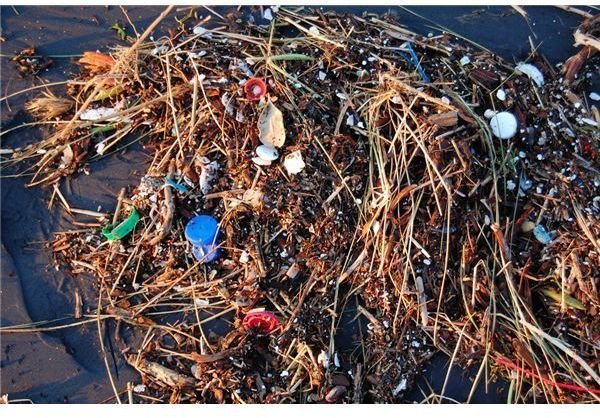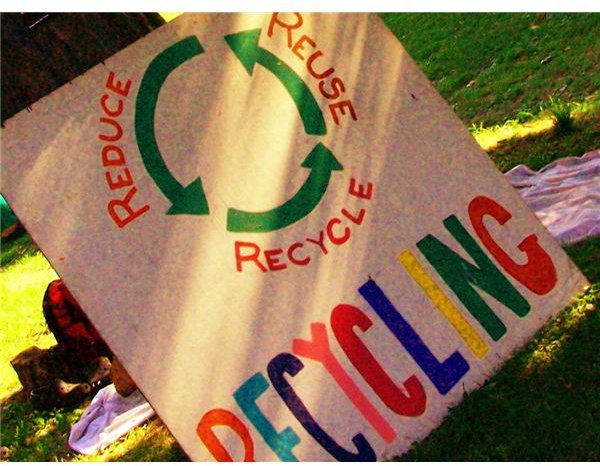The Complex Issue of Plastic Recycling: Better Just to Refuse to Buy?
Reduce, Reuse, Recycle, Refusal?
Anyone with a commitment to sustainability will be on more than familiar terms with the three Rs: Reduce, Reuse, Recycle. This alliterative mantra has long been at the core of our efforts to reduce the environmental impact of the lives we lead, not just because of the values it promotes, but the priorities in puts in place: For a start, aim to use less, then try to re-use whatever materials you can. After that, you can look to recycling as a last resort.
Though this hierarchy makes sense, when it comes to plastic products, many of which are designed to be consumed on a disposable, single-use basis, the question of recycling (traditionally given the least precedence of the three Rs) becomes more pertinent. Reusing plastic products is often difficult due to the fact they are often not intended to be durable. While reducing our use of them is entirely possible, is also extremely trying given the materials remarkable prevalence in our day to day lives.
With this being the case, you’d expect the recycling of plastics to be treated as an essential way to tackle waste. However, while in most European counties systems are in place to ensure plastic waste can be collected and dealt with, in the states (which produces by far the most waste per capita of any country) no such measures exist. Only about 7% of plastics generated in the US are recycled and even this recycling tends to happen in questionable manner, such as being shipped to China where they’re dealt with in a sometimes hazardous way.
While more could be done to raise this figure, many take the view that, given the current way of things, recycling neither can, nor should provide an answer to the plastic problem…
A New ‘R’

As well as the morally dubious and pitifully small scale it’s carried out on, another problem of current modes of plastic recycling is that, to a large extent the majority of the efforts that are undertaken could be more accurately described as ‘down-cycling’ and as such don’t so much ‘close the loop’ of production– the ultimate goal of recycling– but rather delay it’s progress down a linear path of degradation. To quote Dianna Cohen, one of the founders of the Plastic Pollution Coalition: “While a glass bottle can be a glass bottle again or can be used again, a plastic bottle can never be a plastic bottle again.” Rather it will continue to become a lesser and lesser object, assuming it can even be reprocessed in the first place.
Moreover, Cohen and those who share her mindset would argue that having recycling as an option leads to an unhelpful mindset where “You [can] put something in the bin and you don’t have to think about it again”. As a result, they argue changes have to be made ‘up stream’, at the very start of our relationships with plastics. Rather than look at ways we could better utilise the last of the three Rs, they argue we should introduce a fourth and give it pride of place at the top of the pecking order: Refuse.
Simply put, if recycling cannot provide a practical answer the only way we truly behave sustainably is to flatly refuse to purchase plastic materials designed to be almost instantly thrown away. This view, whilst obviously sound in a number of ways, assumes that given the changes in technology and infrastructure and the sums of money it could take to make effective recycling of plastic viable, we can have a greater impact by tackling the way people think.
Unfortunately, changing people’s attitudes, especially ones that are ingrained in the culture that surrounds them, can prove extremely difficult. In this case, it may well be that fighting for what seems to be the simple solution, people to refuse to generate waste, might actually be further out of reach than developing the means to make use of our waste.
Closing the Loop
Traditionally, the problem with getting plastics recycled (aside from legislation and infrastructure) comes from the nature of the material. Whereas metals can be fairly easily recycled, with about 90% of steel in waste products that reach a recycler being recovered, in the case of plastics it’s a much more complex matter and, consequently, despite being a high value resource, only about 5% of plastics can be recovered by conventional recyclers.
The main reason plastics have been recovered and recycled at such low rates is down to the difficulty of sorting the various types of plastic which are either very similar or indistinguishable in terms of their density, colouration and magnetic properties. In less developed countries with more basic resources, the task of separating and effectively sorting plastics becomes pretty much impossible. As a result most plastic waste ends up in landfills, is burnt or goes into the ground.
However, this is now changing thanks to breakthroughs in the approach to recycling made by groups such by Mike Biddle’s MBA Polymers company. By taking the shredded remains of what metal recyclers leave behind and seizing it and grinding the plastics into miniscule pieces of the same type and grade, the group’s plants can create ‘pellets’ of plastic akin to the raw material that would be created using oil.
As the materials needed to produce these pellets can be taken from ‘above-ground mines’ (an attractive euphemism for the mountains of junk we produce) rather than by extracting and manipulating petro-chemicals, it’s cheaper and requires 80-90% less energy. Furthermore the plants can make any kind of plastic, depending on the waste being fed in.
Unfortunately, as the US lacks the collection and recycling policies that are in place at a national level in most other ‘high consumption’ countries, none of the plants capable of turning waste plastic back into a raw material are based in North America, but rather Europe and China. However, these advances point to a possible future in which it will be possible for, not just bottles, but all plastics to be effectively recycled rather than down-cycled.
The Way Forward
Refusal to use plastics designed irresponsibly, and reducing the levels of plastics we do consume will always be the most effective way to stop waste. However it will take an extreme shift in the way the world approaches plastics for refusal and reduction alone to provide an answer. While they should come first, they shouldn’t be seen as rendering the need to advance plastics recycling redundant. A better solution might be to ‘close the loop’ on the two extremes of thinking- that non-consumption is the only way forward/ if we can effectively recycle, consumption isn’t a problem. Both refusal and recycling should be pushed for to achieve a state where, not only are we consuming less, but what we are consuming has been manufactured from materials recovered in an environmentally and economically viable way.
From a US perspective, the target should be (as suggested by the 5 Gyres Institute, who campaign to end plastic pollution) to force “legislative efforts to manage waste.” As Mike Biddle has stated, the chief reason his plastic recycling plants cannot be implemented across the United States is because “materials are not effectively collected, aggregated and concentrated.”
If pressure can put on government to regulate the way waste is managed more effectively this will have the triple benefit of helping emerging, more responsible ways of producing plastics to compete on the scale of petrochemical companies, promoting the wide scale change in attitude toward consumption that’s so sorely needed, and reducing the impact our exported waste has on developing nations.
About the Author: Steve Waller is an environmental blogger working to live more sustainably and help others do the same in the process. He recently set up the Green Steve Shop where you can offset carbon with all your purchases.
References
- Mike Biddle We Can Recycle Plastics - http://www.ted.com/talks/mike_biddle.html?quote=1102
- Dianna Cohen Though Truths About Plastic Recycling - http://www.ted.com/talks/dianna_cohen_tough_truths_about_plastic_pollution.html
- Photo of plastic by Kevin Krejci under CC BY 2.0 via Flickr
- The 5 Gyres Institute What is the Solution - http://5gyres.org/what_is_the_solution
- Mike Biddle A Better Way to Recycle Plastics - http://blog.ted.com/2012/10/22/a-better-way-to-recycle-plastics-mike-biddle-replies-to-questions-and-comments-about-his-2011-tedtalk/
- The Plastic Pollution Coalition - http://plasticpollutioncoalition.org/
- Natalya Stanko Recycling Plastics - http://www.greeniacs.com/GreeniacsArticles/Waste/Recycling-Plastics.html
- Photo of Recycling Sign by andyarthur under CC BY 2.0 via Flickr
- MBA Polymers - http://www.mbapolymers.com/
- NTDTV report on pollution from plastic recycling - http://www.youtube.com/watch?v=UfMTcln6LCU
